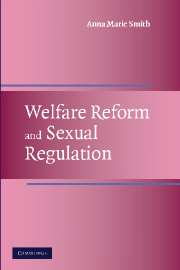Book contents
- Frontmatter
- Contents
- Acknowledgments
- Introduction
- 1 From Paternafare to Marriage Promotion: Sexual Regulation and Welfare Reform
- 2 Biopower and Sexual Regulation
- 3 Post-Foucauldian Sexual Regulation Theory
- 4 The Ideological Construction of Paternafare
- 5 Paternafare Law Today
- 6 Welfare Reform, Reproductive Heterosexuality, and Marriage
- 7 The Normative Assessment of Paternafare: An Ideal-Type Analysis
- 8 Feminist Visions
- Appendix I Gender, Race, and the TANF Population
- Appendix II Family Structure and Poverty
- Appendix III Child Support Enforcement Allocations in a Neoliberal Fiscal Environment
- Appendix IV The “Swarming” of Paternafare
- Appendix V The Disconnection between Poverty and TANF Assistance
- Appendix VI Race, Ethnicity, and the Family Cap
- Index
1 - From Paternafare to Marriage Promotion: Sexual Regulation and Welfare Reform
Published online by Cambridge University Press: 05 June 2012
- Frontmatter
- Contents
- Acknowledgments
- Introduction
- 1 From Paternafare to Marriage Promotion: Sexual Regulation and Welfare Reform
- 2 Biopower and Sexual Regulation
- 3 Post-Foucauldian Sexual Regulation Theory
- 4 The Ideological Construction of Paternafare
- 5 Paternafare Law Today
- 6 Welfare Reform, Reproductive Heterosexuality, and Marriage
- 7 The Normative Assessment of Paternafare: An Ideal-Type Analysis
- 8 Feminist Visions
- Appendix I Gender, Race, and the TANF Population
- Appendix II Family Structure and Poverty
- Appendix III Child Support Enforcement Allocations in a Neoliberal Fiscal Environment
- Appendix IV The “Swarming” of Paternafare
- Appendix V The Disconnection between Poverty and TANF Assistance
- Appendix VI Race, Ethnicity, and the Family Cap
- Index
Summary
In this study, I submit one aspect of welfare reform policy, namely sexual regulation, to close examination. I include within the category of sexual regulation measures such as paternity identification and child support enforcement, the family cap, the promotion of family planning, the state welfare policies designed to encourage poor mothers to give up their children for adoption, the promotion of marriage as a solution to poverty, fatherhood programs, and abstinence education. Inspired by Foucault, I include both the policies that constitute an obvious attempt by the State to influence the intimate and erotic practices of the poor and the initiatives designed to advance the broader goal of patriarchal and racial population management among the poor. Using social theory tools, constitutional doctrine, and extensive legal analysis, I bring to light the mode of governance that is expressed in this constellation of State initiatives. These particular measures deserve our close attention; not only have they not received the public scrutiny that has been allotted to their close cousin, the workfare requirements, but they also represent one of the privileged sites for the development of a particularly problematic form of governance. The postwelfare State is withdrawing from the poor only in the sense that it is massively scaling back redistributive social rights. At the same time, the State is aggressively intervening in the poor mother's intimate life, and that intervention is becoming increasingly defined in a narrow manner with reference to her kinship relations and reproductive behavior.
- Type
- Chapter
- Information
- Welfare Reform and Sexual Regulation , pp. 8 - 34Publisher: Cambridge University PressPrint publication year: 2007



